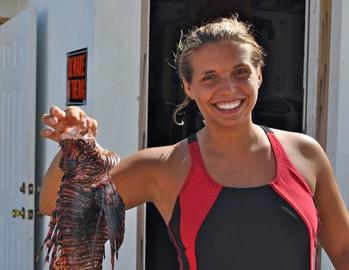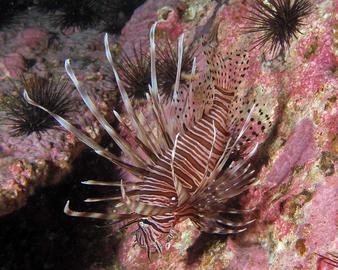We are excited to welcome the newest member of the REEF Team - Elizabeth Underwood, who joined our staff this month as Lionfish Program Coordinator. Elizabeth has been an active REEF member, avid fish counter, dedicated lionfish hunter, and all-round marine science enthusiast for quite some time. Elizabeth was first introduced to REEF in the Spring 2011 when she studied abroad in the Turks and Caicos Islands and conducted her first of many REEF fish surveys and lionfish studies.
Predation by the invasive Indo-Pacific lionfish impacts native fish populations within the Caribbean region and threatens to expand further into Brazil and the Mediterranean. Identifying the range-restricted native fish species with high predation vulnerability in these areas ahead of the invasion front combined with the knowledge of the time a lionfish population typically takes to reach dangerously high densities could help conservation planners attain positive outcomes and reduce biodiversity loss.
$1,726 per person double occupancy ($2,146 single occupancy) - includes: lodging for 7 nights at the Kura Hulanda Lodge, breakfast each morning, 5 days of 2-tank boat dives, r/t airport transportation on Curacao, ground transportation for group activities, and all taxes.
+$200 REEF Program Fee per diver will be added to each package to cover the cost of the group leader, seminar and survey materials.
Invasive lionfish in the western Atlantic are known to be voracious predators. Their unusual hunting behavior suggests that they could prey on most fish species within their gape size limits. Significant research by REEF researchers and others has been conducted looking at stomach contents of lionfish to identify prey. However, relatively few prey species have been identified because of the challenge of identifying partly digested prey. It is also difficult to know how well the identifiable diet reflects the unidentified portion.
$1,534 per person double occupancy - includes: lodging for 7 nights at the Sandton Kura Hulanda Lodge, rental car, breakfast each morning, 5 days of 2-tank boat dives, and all taxes and transfers.
+$200 REEF Program Fee per diver will be added to each package to cover the cost of the group leader, seminar and survey materials.
**For more information and to book your space, contact Martha at REEF Headquarters, trips@REEF.org or 305-852-0030. All proceeds will benefit REEF's Lionfish Control Studies.
This seminal publication was created by REEF and our collaborators at NOAA, ICRI, the United Nations Environment Programme, Caribbean Environment Programme, SPAW-RAC, and the over 40 participants of the 2010 Caribbean Regional Lionfish Workshop. The guide provides best practices for lionfish control and management, including control strategies, outreach and education, research, monitoring, legal considerations, and ideas for securing resources and partnerships.
If you haven't checked out the online REEF Store lately, you might want to head over and get a jump on your holiday shopping! We have added several new items, including Lionfish Jewelry Making Kits, pre-made Lionfish Jewelry Pieces, REEF Mask Straps, several new T-shirts, and a lionfish polespear. And be sure to check out our new Conservation Creatures plush series. Each plush comes with a Conservation Card that provides information about the critter's habitat, characteristics, potential threats, and global distribution in REEF's Survey Project regions.
This paper is the introduction to a special issue of the journal, Marine Ecology Progress Series, titled "Invasion of Atlantic coastal ecosystems by Pacific lionfish". The issue is a compilation of papers presented at the 2015 special session of the Gulf and Caribbean Fisheries Institute meeting, which was co-organized by REEF and partner organizations.
Earlier this year, a special issue of the scientific journal, Marine Ecology Progress Series, was published titled "Invasion of Atlantic Coastal Ecosystems by Pacific Lionfish". The issue is a compilation of papers presented at the 2015 special session of the Gulf and Caribbean Fisheries Institute meeting, which was co-organized by REEF and partner organizations.
The study, conducted by Dr. Stephanie Green (OSU/REEF), Lad Akins (REEF), and others, confirms for the first time that controlling lionfish populations in the western Atlantic Ocean can pave the way for a recovery of native fish. Even if it's one speared fish at a time, data are showing that removals can be effective. And not every lionfish need be removed…the research findings document that reducing lionfish numbers by specified amounts will allow a rapid recovery of native fish biomass.



